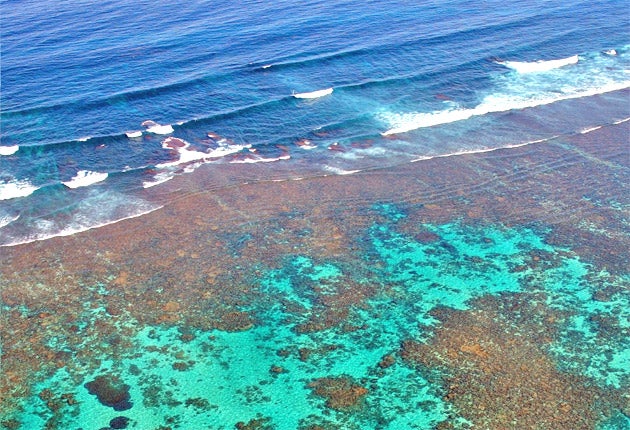Shell oil exploration threatens one of the world's great wonders
Anglo-Dutch conglomerate applies for permit to drill just 30 miles off World Heritage-listed coral reef in Western Australia

Shell Oil has come under heavy criticism for planning an oil and gas drilling site that could threaten a coral reef off the coast of Australia that is among the most valuable marine ecosystems on the planet.
Just 30 miles away from the marine park that protects Ningaloo Reef, a haven for sealife that was recently nominated for World Heritage status, the proposed drilling project has raised fears of an oil spill that could seriously damage the reef and the creatures that depend on it. Warnings of the risks come shortly after a major international report that three quarters of the world's coral reefs are under severe threat of ecological catastrophe from overfishing, pollution, and climate change. Ningaloo is one of the minority that is currently relatively protected from such dangers.
The fears of an oil spill have not just been raised because memories of BP's disaster in the Gulf of Mexico last year are fresh. North-western Australia experienced its own massive spill in the Montara oilfield in the Timor Sea in 2009, which took 74 days to plug.
If a blow-out that size occurred at Ningaloo, it could seriously damage the 175-mile reef and jeopardise the marine life that depends on it, WWF-Australia warned yesterday. The group pointed to Shell Australia's own modelling, which envisages the worst-case scenario of an oil spill covering a substantial area just off the coast.
Shell itself insists that it has "a very strong commitment to the protection of biodiversity". But environmentalists are not reassured. "It only takes one accident to create an environmental catastrophe," said Robin Chapple, a state Greens politician in Western Australia.
Less well known than the Great Barrier Reef but equally spectacular, Ningaloo Reef is a haven for marine life, particularly the giant whale sharks that congregate there every autumn to feed. It is one of the longest fringing reefs on the planet.
One threat was fought off a decade ago, when plans for a major resort at Ningaloo were vetoed by the Western Australian government following a campaign backed by international celebrities.
Highly unusual because it hugs the coastline – at its nearest point, the reef is only 100 yards offshore – Ningaloo is home to 300 species of coral and 500 species of fish, including sharks, manta rays, dolphins and humpback whales. Four of the world's seven marine turtles, all of them vulnerable or endangered, are found in its turquoise waters.
But the area, close to the small town of Exmouth, is best known for the whale sharks – the world's biggest fish species, growing up to 18m (59ft) long – that gather from April to July, after a mass coral spawning. Eco-tourism operators offer visitors the chance to snorkel and dive with the enormous creatures.
In the early 2000s, plans to build a resort and marina were opposed by, among others, the actress Greta Scacchi and the British botanist David Bellamy, who called Ningaloo "one of the world's most special places". The Australian novelist Tim Winton, on winning Western Australia's main literary award in 2002, donated his A$25,000 prize money (equivalent to £8,850 then) to the campaign.
The following year, the state premier, Geoff Gallop, rejected the development proposal, saying it would jeopardise "one of the world's great natural wonders" and declaring: "Today we have drawn a line in the sand."
Nominated for World Heritage listing last year, Ningaloo is tipped to receive the nod from Unesco soon. In their submission, the state and federal governments describe it as "a unique place... unsurpassed among coral reefs for displaying the interaction of history, physical environment and ecology".
Nevertheless, the two governments, which would receive millions of dollars in royalties if oil and gas were found, are expected to approve Shell's proposal to spend 60 days drilling in mile-deep waters, possibly as early as September.
In a statement, Shell said it applied "a very high standard of operating practices" and adhered to "strict environmental plans in all our operations". However, WWF-Australia said the Gulf of Mexico spill demonstrated that "drilling accidents can happen to even the biggest companies in the business" – particularly when carrying out deep-water drilling.
The group's conservation manager for Western Australia, Paul Gamblin, said only luck had prevented the Montara slick from reaching the pristine Kimberley coastline, more than 150 miles away. Ningaloo, he said, was one of the world's few remaining healthy reefs. "It's one of those places that is just humming with life and is quite amazing, so the fact that the oil and gas industry is getting closer and closer all the time is of great concern," he said. "This could be the beginning of a whole new push into areas that run right along the reef itself."
BP recently announced plans to carry out seismic exploration, with a view to deepwater drilling, in the Great Australian Bight, off the South Australian coast: another site exceptionally rich in marine life. Mr Gamblin said exploration should not be approved in such sensitive areas until a network of marine parks had been established, which was one of the government's election promises.
Join our commenting forum
Join thought-provoking conversations, follow other Independent readers and see their replies
Comments
Bookmark popover
Removed from bookmarks